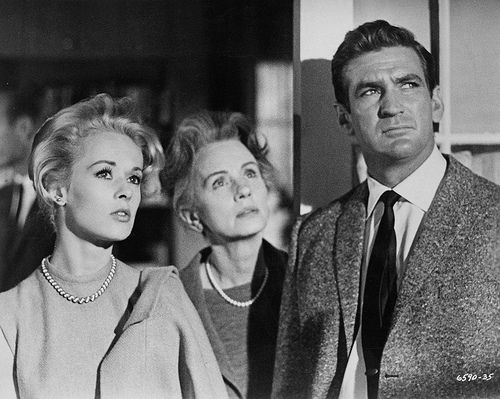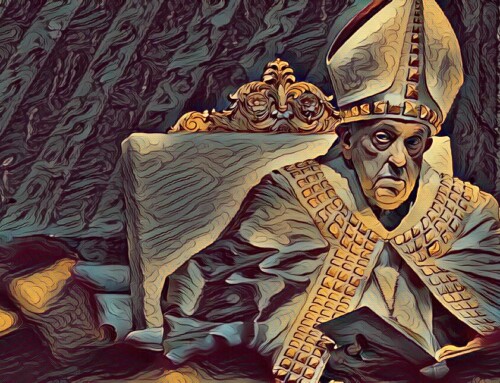With little exception, every Alfred Hitchcock film, especially “Psycho,” “Rear Window,” and “Vertigo,” are usually rather explicit examinations of the sexual psyche. The aforementioned titles all delved into voyeurism, while “Psycho” gets into homosexuality and transvestitism, and “Vertigo” deals with pornography obsession. The other Hitchcock work to seriously consider homosexuality was “The Birds.” Released in 1963, “The Bird’s” was Hitchcock’s follow-up to “Psycho;” and, it’s a fitting bookend to that masterpiece. Because, here, the mother-son relationship is further examined; in “The Birds,” it’s the characters of Lydia Brenner and Mitch Brenner portrayed by Jessica Tandy and Rod Taylor. Taylor plays a suave San Francisco lawyer: handsome, accomplished, but unmarried and unattached. Later in the story, we find out that he has had only one serious known relationship with a female – to the sexy, but unthreatening, school teacher Annie; a relationship that was quickly sabotaged by his clinging and passive-aggressive mother. When Mitch meets super-rich and snotty Melanie, the blonde-ice-queen of “The Birds,” played by Tippi Hedren, in the tradition of the other Hitchcock blondes: Grace Kelly and Kim Novak, he is cold and callous and overacts to her rather innocent mischief making. In that meeting, she is eventually the aggressor, as he walks away and she ends-up pursuing him. Later, when Melanie follows Mitch back to his hometown, she discovers that Mitch is constantly huddled over by his sinisterly cloying mother. As they flirt back and forth, he consistently evades; only making a move towards her because he thinks Melanie is game for a quick sexual escapade.
In “The Birds,” Hitchcock elegantly studies a different form of homosexuality than the more effeminate strain that he took on in “Psycho.” Whereas the fatherless and female smothered boy in “Psycho” turns to cross-dressing and sexual murders, Mitch in “The Birds” is haunted by the missing influence of masculinity, symbolized by the ever present and manly portrait of his dead father that hangs in the family living-room, and tortured by the omnipresent feminine – represented by his mother. These unnatural interrelationships of borderline incest create an ever-present air of a world unbalanced – represented by the increasing hostility of the birds. The family is dysfunctional, therefore, Nature follows suit. And, Mitch is at the center of this maelstrom, as he tries to genuinely love a woman while struggling to escape his mother. So far, as an adult, he is incapable of being close to any female, except his mother. Other women, he unemotionally disregards, as he did the still wounded Annie, or selfishly appraises as mere occasional sexual playthings. Given that, throughout much of the film, he remains neutered: a little boy around his mother, and an outwardly macho, but noncommittal man around Melanie. His image reminds me of the hyper-masculine caricatures put on by gay men who wish to ape like a straight guy. He is a butch gay man; a bit of a dandy, self-centered and seemingly put-together, but mentally a mess. Externally, he tends to take charge with efficiency, while his interior struggles remain churning and unresolved. Only towards the end: when he, his mother, and Melanie are trapped within the Brenner home, surrounded by marauding and murderous birds, does Mitch take charge and finally reject the death-grip of his mother; and, henceforth, she transfers that maternal love towards the recently injured Melanie. If he had not done this, he would have been forever locked into a false sort of masculinity that is aggressive and showy, but not really vulnerable or giving. In the final scene, when Mitch reemerges from the house, the birds are finally quiet; he packs everyone into the car, Lydia and Melanie embrace, and they drive away.





